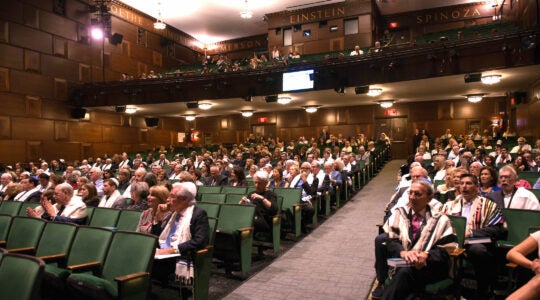Turkey may not have been on the menu for the first Thanksgiving in 1621, historians now concede, but there is no doubt that the Pilgrims feasted on the bounty of the New World. Now, almost 500 years later, the food that immigrants eat is again all the rage, but this time with a focus on the dishes and flavors that they have brought from their homelands. Jewish food, once frowned upon by “native born” Americans, is, unexpectedly, one of these trendy cuisines, with a host of Jewish millennials throughout the country reinventing “immigrant” Jewish food for the 21st century.
Jeffrey Yoskowitz, Liz Alpern and Jackie Lilinshtein founded The Gefilteria in 2012 in order to bring Eastern European Jewish staples like gefilte fish and matzah balls into harmony with contemporary culinary and environmental sensibilities. After he spent some time working on an organic farm, Yoskowitz told me, he intuited that Jewish gastronomy had a kind of “wisdom” and “order” that had been obscured. “Jews had to learn to preserve food through pickling,” he said. “And they had to be resilient and resourceful in the face of scarcity.”
Yoskowitz realized that prosperous 20th-century Americans had gotten things backward, in that “our ancestors would eat a pickle and, if they were lucky, some pastrami; we eat the pastrami sandwich with the pickle on the side.” Further, he and his partners could draw inspiration from chefs of other ethnicities who were rediscovering their own immigrant foods; one of the most unusual recipes in “The Gefilte Manifesto,” Yoskowitz and Alpern’s new cookbook (published in September), is for Ashkenazi kimchi, which a Korean friend helped them to develop, along with kimchi-stuffed cabbage.
Many of the customers for this new wave of Jewish food are not Jewish, according to Sasha Chack, who ran the café at the 92nd Street Y outpost in Tribeca, where he served house-cured gravlax and hijiki seaweed salad. After that closed in 2013, he opened Mason and Mug, a short-lived kosher restaurant in Prospect Heights, Brooklyn; it quickly won a following for its deviled kale salad, yucca fries and celery root soup.
Chack, who returned last year to his native Louisville, Ky., now focuses on pop-up events like a Jewish appetizing brunch held just before Passover that drew more than 300 people, the majority of whom were non-Jews, to the gentrifying East Market District (known as “Nulu”). Chack kashered a local bagel place, along with a bakery, in order to serve rabbinically certified bagels and black-and-white cookies.
Meanwhile, “neo-retro” delis like the Mile End in Brooklyn, Wexler’s in L.A., and Kenny and Zuke’s in Portland, Ore., are smoking and spicing their own meats and fish. Brad Rubin owns the Eleven City Diner, a kosher-style, artisanal Jewish deli in the South Loop of Chicago. (He also has another location in the Windy City, and he is just about to open one on Wilshire Boulevard in L.A.) “I’m not reinventing the wheel, just giving it a new spin,” he quipped of his approach to traditional Jewish food.
Salads composed of kale, quinoa and farro thus share space on the Eleven City’s menu with matzah ball soup made with real schmaltz and challah French toast topped with white chocolate sauce or orange sueňo. “We’re close to Chinatown, so a lot of our customers are Asian,” Rubin said. The only day that he closes is Thanksgiving; the deli is open on Christmas, when a lot of the Asian customers come in, inverting the familiar pattern of Jews eating in Chinese restaurants on Christmas Eve. (Rubin impishly serves fortune cookies on Christmas Eve as a nod to that American Jewish ritual.)
Lara Rabinovitch writes about food for the L.A. Times; she also worked on last year’s documentary, “City of Gold,” about Pulitzer Prize-winning restaurant critic Jonathan Gold. When we met for coffee a couple of weeks ago in the trendy Larchmont section of L.A., Rabinovitch noted that the demonization of immigrants in the recent campaign season makes it “too soon to tell how this election will affect this resurgence of immigrant cuisines.” But she said that “one can easily imagine two scenarios: on the one hand, half of America will cling to its baloney sandwiches on white bread, whereas the other half will embrace—with newfound fervor—samosas, galbi [Korean short rib] and tacos.”
“In the Jewish world,” she continued, “Who knows? Maybe Ivanka will share a recipe for matzah ball soup.”
Ted Merwin teaches religion and Judaic studies at Dickinson College. He writes about theater for the paper and is the author, most recently, of “Pastrami on Rye: An Overstuffed History of the Jewish Deli.”
The New York Jewish Week brings you the stories behind the headlines, keeping you connected to Jewish life in New York. Help sustain the reporting you trust by donating today.




